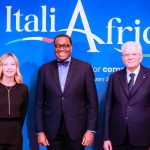Oando PLC to Host 5th Edition of its Webinar Series Themed ‘COVID-19: Vaccinating The Shadow Pandemic’
Oando PLC to Host 5th Edition of its Webinar Series Themed ‘COVID-19: Vaccinating The Shadow Pandemic’
Oando PLC, is set to host the 5th edition of its quarterly Webinar Series themed, ‘COVID-19: Vaccinating the Shadow Pandemic’, in partnership with the Nigerian Economic Summit Group (NESG), Africa Business Radio and Ventures Africa.
The webinar, which is scheduled to hold on May 18, 2021, at 11 a.m. (WAT), is free for all to attend and will feature a diverse panel representing key players in the fight to end gender-based violence. The panelists include Dr. Kemi DaSilva-Ibru, Founder, Women at Risk International Foundation (WARIF); Tosin Akibu, Technical Coherence Specialist, UN/EU Spotlight Initiative; Dr. Oliver Stolpe, Nigeria Representative, United Nations Office on Drugs and Crime (UNODC); and Dr. Tomiwa Erinosho, CTO and Co-Founder, Towntalk Solutions Inc. Ademola Ogunbanjo, General Manager, Business Support Group, Oando Energy Resources, will moderate the session.
At the onset of the COVID-19 pandemic, analysts feared it would mark a disaster for women. The strain of coronavirus lockdowns would exact a disproportionate toll on genders, forcing more women out of the workforce, deepening their load of uncompensated labour, and leaving them more vulnerable to domestic violence. All these concerns proved to be true. But the social damage wrought by what has been dubbed the “shadow pandemic” may be felt for decades to come.
One of the panelists, Tosin Akibu, Programme Specialist Spotlight Initiative- UN Women Nigeria, granted an interview on Gender Based Violence (GBV) Amid the Second Wave of the Covid-19 Pandemic. According to her, “Nigeria witnessed an increase in reported cases of Sexual and Gender-Based Violence (SGBV) targeted at women and girls. Service providers reported a sharp increase in cases of intimate partner violence and domestic violence. Data on reported incidents of GBV cases in Nigeria based on information collection from 24 states showed that in March, the total number of GBV incidents reported were 346, while in the first part of April, incident reports spiked to 794, depicting a 56 per cent increase in just two weeks of lockdown”.
In 2020, the United Nations Population Fund (UNFPA) reported that every three months of lockdown could result in 15 million more cases of domestic abuse than would normally be expected. The United Nations describes COVID-19 as a crisis with a woman’s face, with an estimated 736 million women being subjected to intimate partner violence, non-partner sexual violence, or both at least once in their life. Today, the risk of child marriage is highest in Sub-Saharan Africa, where more than one in three women aged 20–24 years were married before the age of 18.
Against this backdrop, the webinar will examine long-term strategic approaches in line with the Sustainable Development Goal (SDG5) on Gender Equality, including promoting economic, social and political empowerment of women and the girl child.
The panelists, with combined industry experience of over 30 years, will examine pivotal issues around COVID-19, such as the impact of data and technology in mitigating gender-based violence and related insecurities faced by women; the role of Governments, private sector and philanthropies as well as gender stereotypes and unequal gender roles facing marginalized communities in Africa, to name a few. The session is intended to proffer actionable solutions to address some of the continent and country’s unique challenges. Finally, attendees will be given the opportunity to engage with panelists via a Q&A session.
Speaking on the shadow pandemic on CNN’s ‘As Equals’ Series, Dr. DaSilva-Ibru stated that “Violence against women and girls is one of the most pervasive forms of human rights violations and should be recognized by all countries. So, with or without the pandemic, the work to protect girls and women continues, because every girl and woman, no matter what part of the world she lives, has the right to live in a society free of any form of violence against her”.
This further reinforces how deeply gender inequality remains embedded in the world’s social and economic systems and points to the prevalent gender crisis in Africa and the globe. It reflects the glaring need for Africa to engineer, re-set and reignite the Decade of Action for the Sustainable Development Goals and chart a path to an equal future for women and men. It is against this backdrop that the 5th edition of the Oando Webinar Series (OWS) will hold.





Leave a Reply